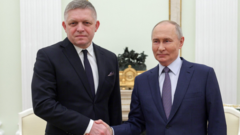As Ukraine prepares to launch long-range strikes inside Russian territory with U.S.-provided missiles, the political landscape could shift dramatically with Donald Trump's potential return to the White House. This timing raises questions about the long-term U.S. commitment to Ukraine amidst the war.
Ukrainian Military Gains Momentum Amid Political Uncertainty

Ukrainian Military Gains Momentum Amid Political Uncertainty
Ukraine's ongoing military operations receive new support, but future prospects remain uncertain with the upcoming U.S. administration transition.
Concerns over direct conflict escalation between NATO and Russia mount, as Biden pushes for global support at the G20 summit while pledging increased military backing for Ukraine's defense efforts. What lies ahead may heavily depend on the strategies of the incoming administration.
Ukrainian soldiers heading toward the Kursk region of Russia are poised to capitalize on the recent delivery of long-range missiles from the U.S., as President Biden's administration responds to Kyiv's requests for deeper strikes against Russian forces. This military enablement comes at a crucial time, with Ukrainian leaders signaling that operations could commence soon.
However, the short-term advantage may be overshadowed by the looming political transition in the United States. With Donald Trump positioned to take office in January, uncertainty surrounds the future of American support for Ukraine, especially given Trump's desire to expedite a resolution to the conflict without detailed strategies outlined.
American defense officials anticipate these new Army Tactical Missile Systems will initially target Russian and North Korean troops in the Kursk area, a strategic decision that some military experts claim may not significantly alter the trajectory of the ongoing war.
In response to the missile deployment, the Kremlin has issued a warning, describing it as a perilous step that increases the likelihood of a direct confrontation between Russia and NATO allies. This tension was palpable as Biden concluded the G20 summit in Brazil, utilizing his final moments to urge global leaders to amplify assistance for Ukraine.
While the military support signals a robust response to Russia's actions, analysts caution that the evolving political dynamics may ultimately shape Ukraine's military strategy and its implications for the broader geopolitical landscape.
Ukrainian soldiers heading toward the Kursk region of Russia are poised to capitalize on the recent delivery of long-range missiles from the U.S., as President Biden's administration responds to Kyiv's requests for deeper strikes against Russian forces. This military enablement comes at a crucial time, with Ukrainian leaders signaling that operations could commence soon.
However, the short-term advantage may be overshadowed by the looming political transition in the United States. With Donald Trump positioned to take office in January, uncertainty surrounds the future of American support for Ukraine, especially given Trump's desire to expedite a resolution to the conflict without detailed strategies outlined.
American defense officials anticipate these new Army Tactical Missile Systems will initially target Russian and North Korean troops in the Kursk area, a strategic decision that some military experts claim may not significantly alter the trajectory of the ongoing war.
In response to the missile deployment, the Kremlin has issued a warning, describing it as a perilous step that increases the likelihood of a direct confrontation between Russia and NATO allies. This tension was palpable as Biden concluded the G20 summit in Brazil, utilizing his final moments to urge global leaders to amplify assistance for Ukraine.
While the military support signals a robust response to Russia's actions, analysts caution that the evolving political dynamics may ultimately shape Ukraine's military strategy and its implications for the broader geopolitical landscape.



















